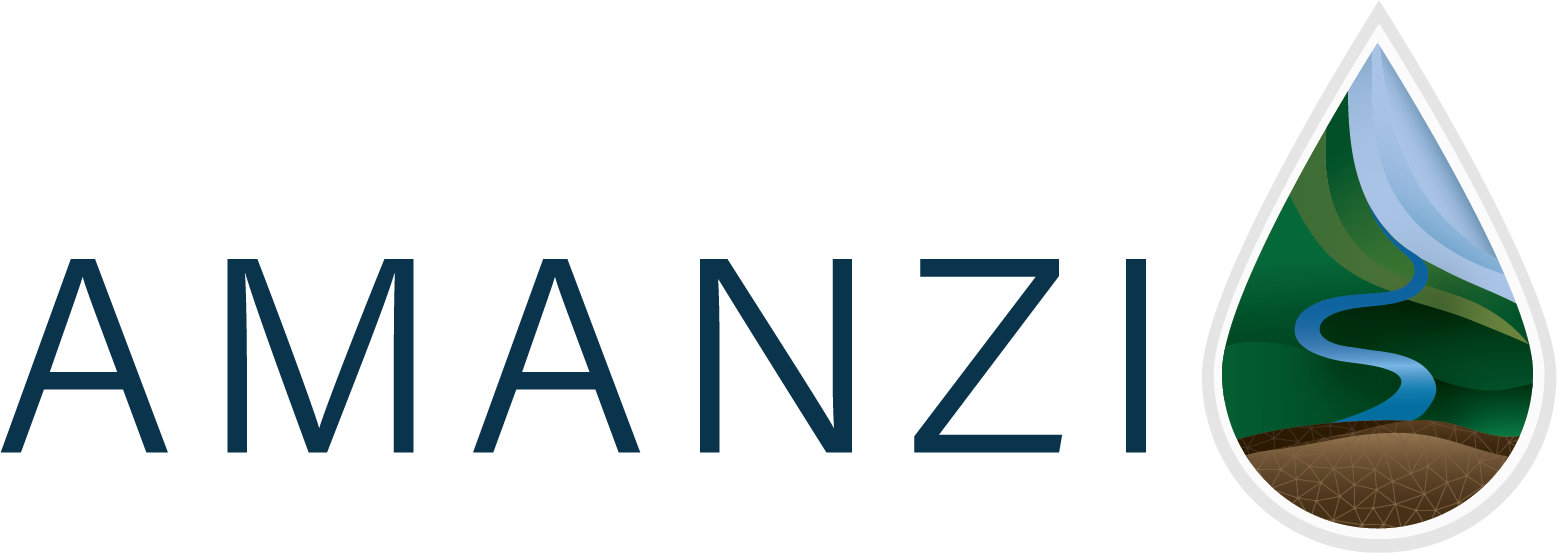Building and Installing Amanzi Using CMake#
Building Amanzi#
Amanzi depends on several external software packages or third party libraries
(TPL) to build. Before building Amanzi a user must either build each of these
TPLs, provide an installation path for each TPL or define the include directories
and libraries needed for each TPL. We recommend that users build Amanzi and all the
TPLs using the boostrap.sh shell script found in the config directory.
The script can be run from the source directory. On most
UNIX flavored systems, this script will build and install Amanzi and all the required
TPLs with little information from the user. The script has prerequisites for
compilers, LAPACK/BLAS and MPI. Please read
Amanzi Third Party Library (TPL) Build System section for more information and Quickstart Using Bootstrap for installing using the bootstrap.sh.
We recommended that users install the TPLs in separate directory, since a full TPL build
should be an infrequent task. This is the default behavior of the bootstrap.sh
script. See bootstrap.sh --help for more information on how to
control the installation paths. The TPL build will generate a CMake configuration file
that defines all the required TPL directories and CMake variables to build Amanzi.
Once the user has installed all the required TPLs, the process to build
Amanzi from the command line is:
Generate build files (Makefile, XCode project files, etc.) using CMake
cmake -C <TPL install prefix>/share/cmake/amanzi-tpl-config.cmake \ -D CMAKE_C_COMPILER=/full/path/mpicc \ -D CMAKE_CXX_COMPILER=/full/path/mpicxx \ -D CMAKE_Fortran_COMPILER=/full/path/mpif90 \ [Addtional CMake variable definitions] <Amanzi source directory>Use the build files to build Amanzi, i.e.
make,make [-j n]
or the user can run bootstrap.sh defining a previously built TPL configuration with
bootstrap.sh --tpl-config-file=<TPL install prefix>/share/cmake/amanzi-tpl-config.cmake
Amanzi TPL Configuration Settings#
We recommend that users build all the TPLs using the Amanzi SuperBuild project. This will create a CMake file that will initialize the cache settings for all the TPLs. Instructions in this section are designed for advanced users.
The Amanzi CMake files search for each TPL through the CMake find_package function.
Each TPL has a search path defined by the variable <TPL_Name>_DIR where
TPL_Name is the name of the package. The Amanzi CMake files search for the
appropriate include directories and libraries for this package. The search
also includes searching for dependent packages. For example, searching for
ASCEM-IO also triggers a search for HDF5 since ASCEM-IO depends on HDF5.
The exceptions to this variable naming convention are Boost and HDF5. For these
packages, Amanzi uses the CMake FindBoost module found in the CMake installation
and the FindHDF5 module found in the tools/cmake/Modules directory.
Users can bypass the package search by defining the <TPL_Name>_INCLUDE_DIRS
and <TPL_Name>_LIBRARIES variables. These variables should contain the full
path name of the include directories and libraries for that TPL and ANY
dependent package the TPL requires to build and link against. For example,
if you want to bypass the ExodusII search logic, then define
ExodusII_INCLUDE_DIRS and ExodusII_LIBRARIES and these variables must
also contain the NetCDF include directories and libraries. These variables
are CMake list types. Each directory or filename should be separated with
a semicolon.
Amanzi Build Configuration Settings#
The naming convention for Amanzi build options is ENABLE_<Feature_Name> and is a boolean type (ON,OFF). The current build options with the default values are documented here.
ENABLE_Structured:
Default: OFF
Description: Build structured mesh capability.
Dependencies: CCSE
ENABLE_Unstructured:
Default: OFF
Description: Build unstructured mesh capability.
Dependencies: At leat one of the mesh frame works, STK, MSTK or MOAB.
ENABLE_DBC:
Default: ON
Description: Enable design by contract build.
Dependencies:
ENABLE_Config_Report:
Default: ON
Description: Print out configuration report to the terminal.
Dependencies:
ENABLE_MESH_MSTK:
Default: OFF
Description: Build the MSTK mesh frame work.
Dependencies: MSTK
ENABLE_MESH_MOAB:
Default: OFF
Description: Build the MOAB mesh frame work.
Dependencies: MOAB, requires a specific version. See Software Requires for more information.
ENABLE_CCSE_TOOLS:
Default: OFF
Description: Build structured AMR post processing tools
Dependencies: python, f2py, gfortran compatible with mpif90
ENABLE_UnitTest:
Default: ON
Description: Build the unit test test suite.
Dependencies: UnitTest++
ENABLE_OpenMP:
Default: OFF
Description: Build Amanzi executables with OpenMP support.
Dependencies: OpenMP
Installing Amanzi#
CMake will generate an install target in build files. For Makefiles,
make install will install Amanzi under the directory defined by
CMAKE_INSTALL_PREFIX. The default install location is /usr/local.
Once installed, other CMake software projects can build and link against Amanzi as a library. See https://software.lanl.gov/ascem/trac/wiki/Amanzi/BuildSystemIntegration for a simple example.
